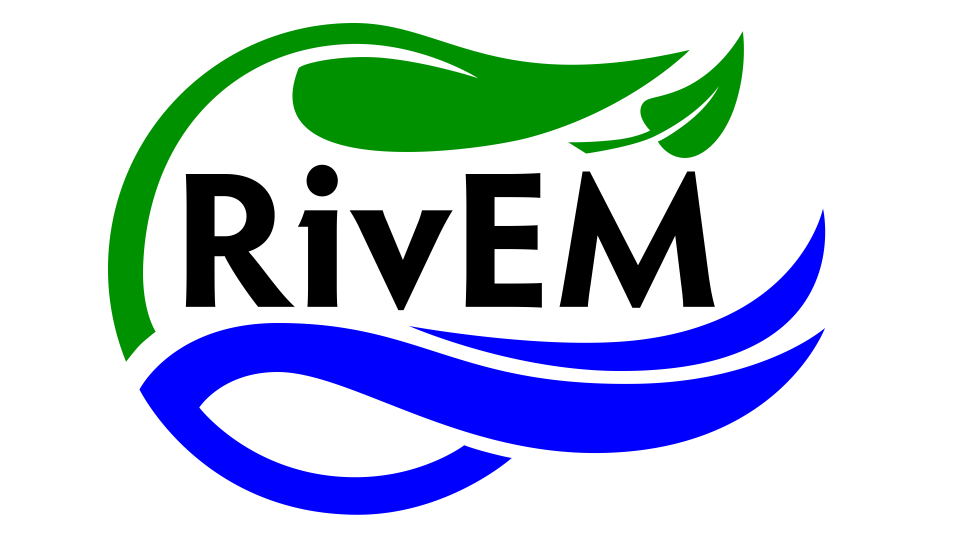Seminar Up: Effects of Wintertime Hydropeaking on Riparian Zones
Posted by Louis Addo | Seminar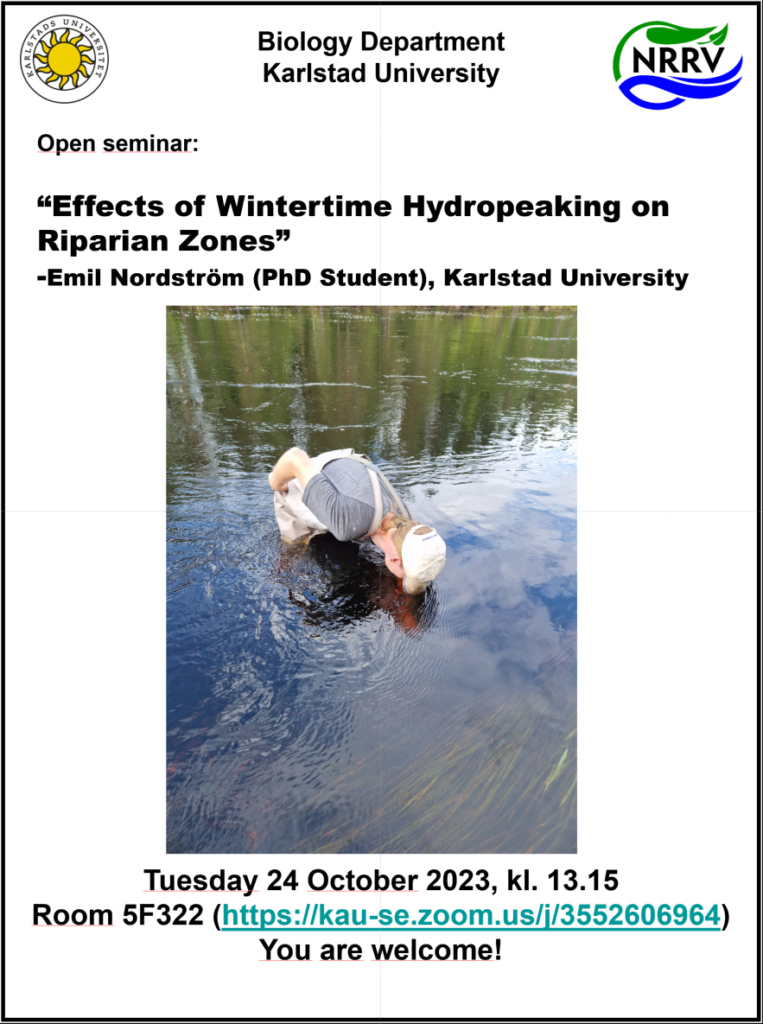

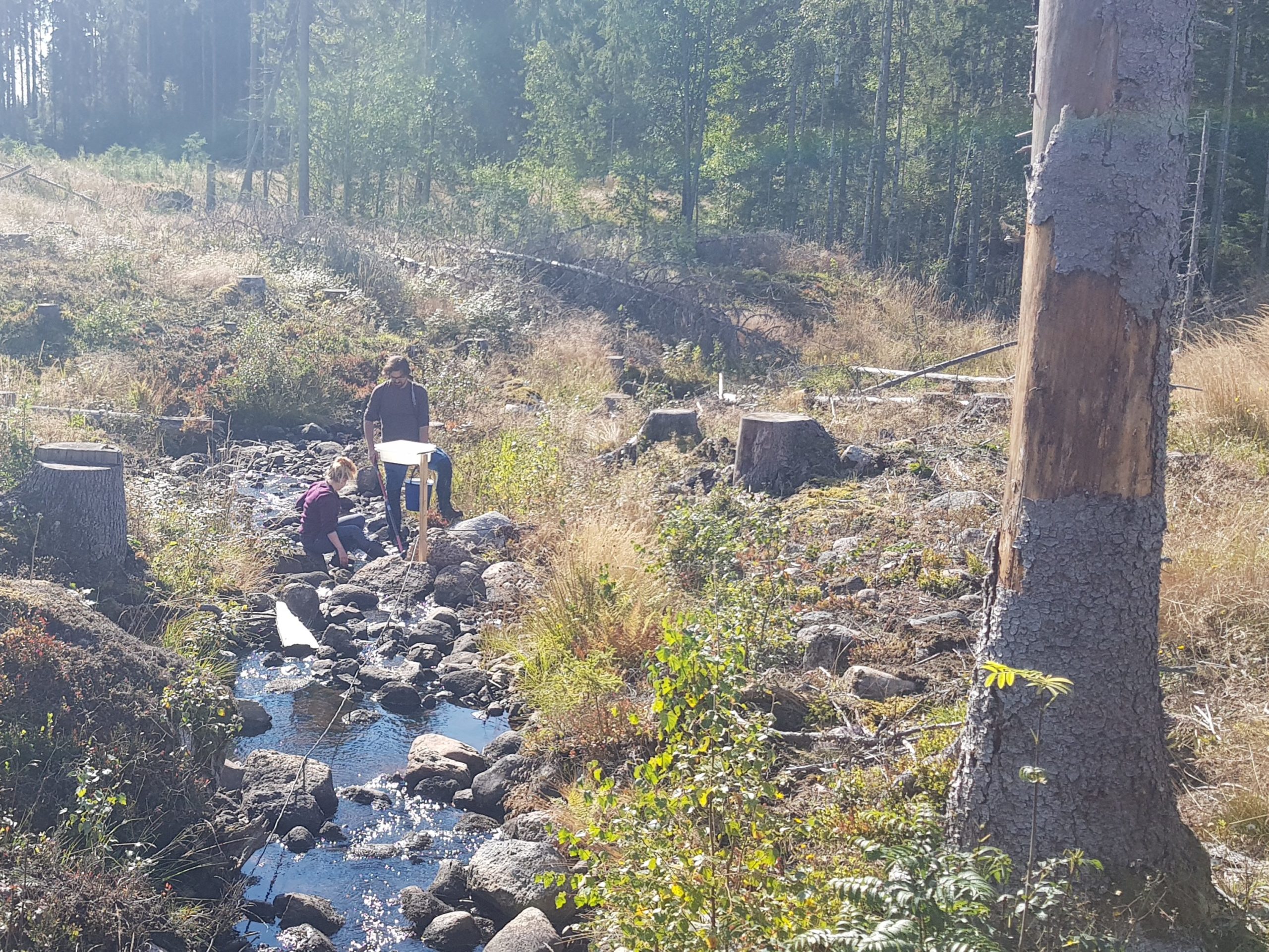
On Tuesday 1 December Jeffery Marker, RivEM PhD student, will be giving a talk where he presents the plans for his PhD project.
The seminar is held on Zoom and starts at 13:15. Everyone is welcome to attend the seminar. Contact Jeff (jeffery.marker@kau.se) or Olle Calles (olle.calles@kau.se) if you want to attend, and they will send you a link.
On Tuesday 14 January, Jacqueline Hoppenreijs, RivEM PhD-student, will give a seminar titled “Rooting for riparian vegetation”. Jacqueline will present her plans for her PhD project during the seminar, with emphasis on her fieldwork this summer.
The seminar starts at 13:15 in room 5F416 at Karlstad University. Everyone who wants to are welcome to attend the seminar.
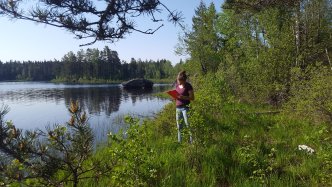
Jacqueline doing fieldwork
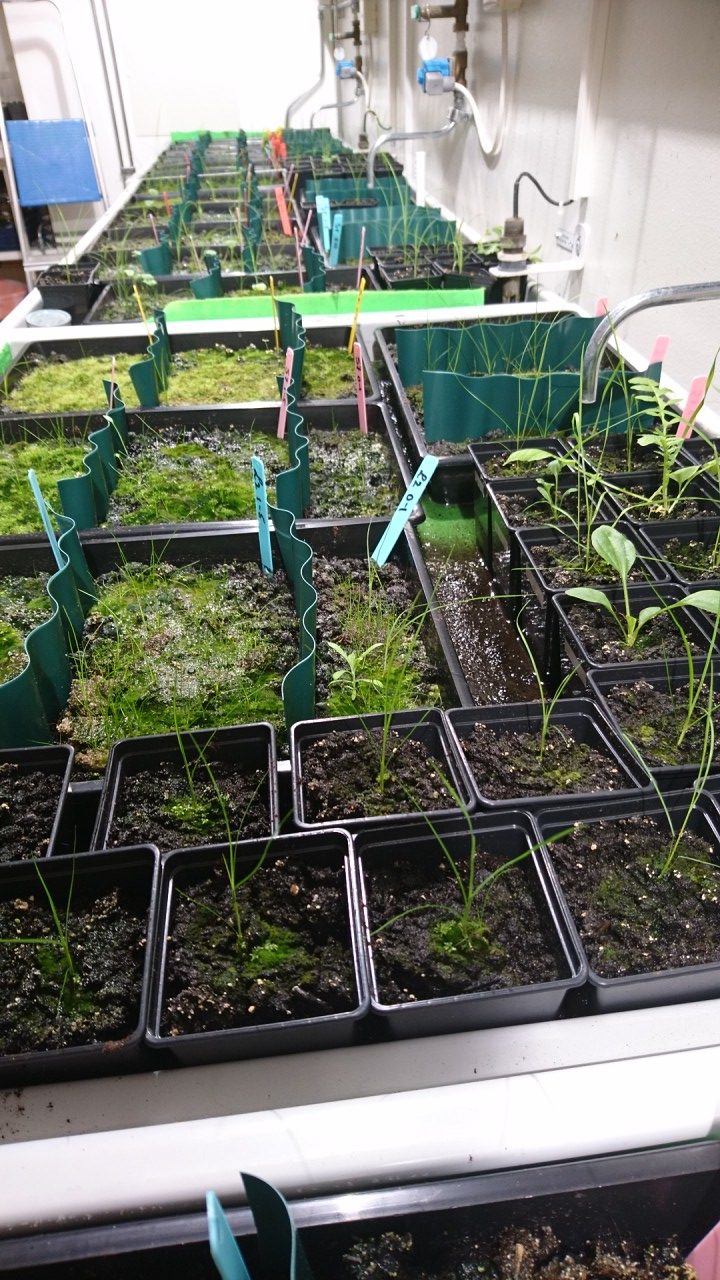
Riparian plants in the growroom at Karlstad University
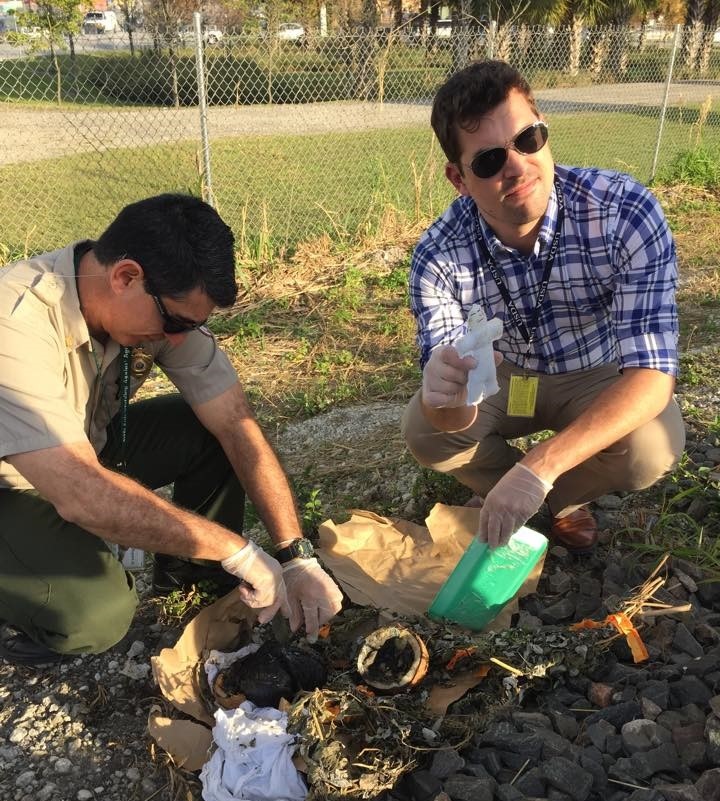
Jeff (right) and a former colleague inspecting Santeria sacrifices in Miami, Florida, USA. Santeria worshipers use a variety of plants, herbs, and animals to perform religious sacrifices. Some hypothesize that the very invasive African land snail (Achatina fulica) was brought into the United States to use in these rituals. Photo by Kelsey Branch
Jeff Marker recently started his PhD at Karlstad University. Here he writes about his previous work and what he intends to do as a PhD student at Karlstad University:
“Hej and hello, my name is Jeff Marker and I am a PhD student here at Karlstad University in the NRRV Research Group. Originally hailing from the Great Plains region of the United States, I am now settled here in Sweden working on riparian ecology, food webs, spider predation, and forestry policy. I began my academic career focused on tropical plant science questions, specifically the best ways to grow and maintain a year round seed corn nursery in Hawaii. After a short stretch in the agribusiness industry, I turned my attention to invasive pests and plant disease monitoring with the United States Department of Agriculture. As a Plant Protection and Quarantine Officer I was tasked with enforcing USDA quarantine laws related to invasive species, agricultural smuggling, and agricultural trade compliance. It was here that I rediscovered my love of insects, especially the beetles. Over the years I amassed a large working and personal collection of beetles from the Cerambycidae and Buprestidae families from the Midwest and Great Plains regions of the U.S. Eventually I left the beetles behind, put on a suit and tie, and ended up in Washington D.C. as an agricultural policy analyst where I focused on international quarantine regulations and the agricultural quarantine inspection process.
After meeting a wonderful Swedish woman and taking stock of my life, I was easily convinced to move to Gothenburg in 2016. Upon moving to Sweden, I restarted my graduate education and completed my MSc here at KAU through the Ecology and Conservation Biology Program. My thesis focused on the effects of urban areas on Swedish beetles that utilize dead or decaying wood for all or part of their life cycle. I believe that urban areas have a mixed, but often overlooked, effect on insect biodiversity. On one hand increased urbanization and a focus on specific types of habitat removal (i.e. dead or decaying wood) can be a direct threat to ecosystem health and/or function. However, urban areas often have significantly more plant and arthropod diversity when compared to the surrounding natural, managed, and rural landscapes. And while urban areas can be prone to invasive pest outbreaks and poor management decisions, with proper care and monitoring they also have potential to become biodiversity hotspots and some of the most resilient ecosystems in the face of a changing climate and changing attitudes about nature.
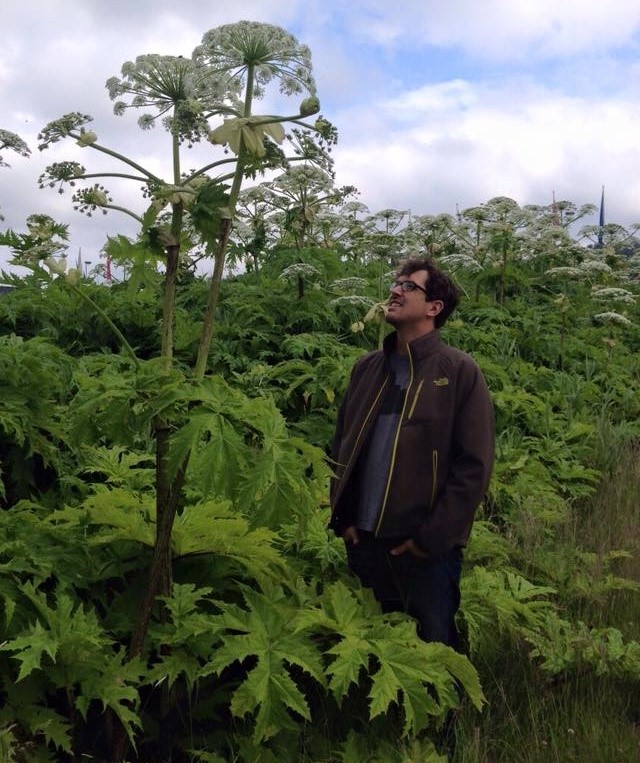
Jeff in Gothenburg admiring some giant hogweed/jätteloka (Heracleum mantegazzianum), a European and North American invasive species with the potential to cause a severe phototoxic effect on human skin. Photo by Johanna Jonstrand
As a researcher at KAU I will combine my love of arthropods and my background in public policy to analyze forestry management practices and their effects on riparian ecosystems. While here I hope to share my knowledge about insects and agriculture but more importantly, I am excited to learn about spiders and cutting edge genetic techniques including stable isotope analysis and DNA-barcoding. Under the supervision of Eva Bergman, Lutz Eckstein, Ann Erlandsson, Rachel Bowes, and Denis Lafage I will carry out a range of experiments to examine the link between riparian forest buffer width and its effect on predator community functional diversity, riparian ecosystem function, and food web complexity. Currently I am conducting feeding experiments on wolf spiders (Lycosidae) to determine the time that specific prey DNA is detectable in their guts after predation events. This lab experiment will act as a primer for our future field studies in the Värmland and Örebro areas that will include intensive ecosystem sampling of terrestrial and aquatic communities. Our project will collaborate closely with forestry stakeholders, Swedish country administrative boards, Skogsstyrelsen, and other scientists involved in similar work. Ultimately we will work with these same groups to craft riparian buffer strip guidelines that intersect the needs of Swedish forestry with the health of Swedish riparian ecosystems to help build on sustainable forestry concepts.
Outside of the research arena I spend my time teaching my daughter to love and respect all the småkryp and playing and collecting board games. If you ever want to talk beetles or board games feel free to swing by my KAU office any time. You can follow my research and occasional musing on Instagram or Twitter both @sverige_saps.”
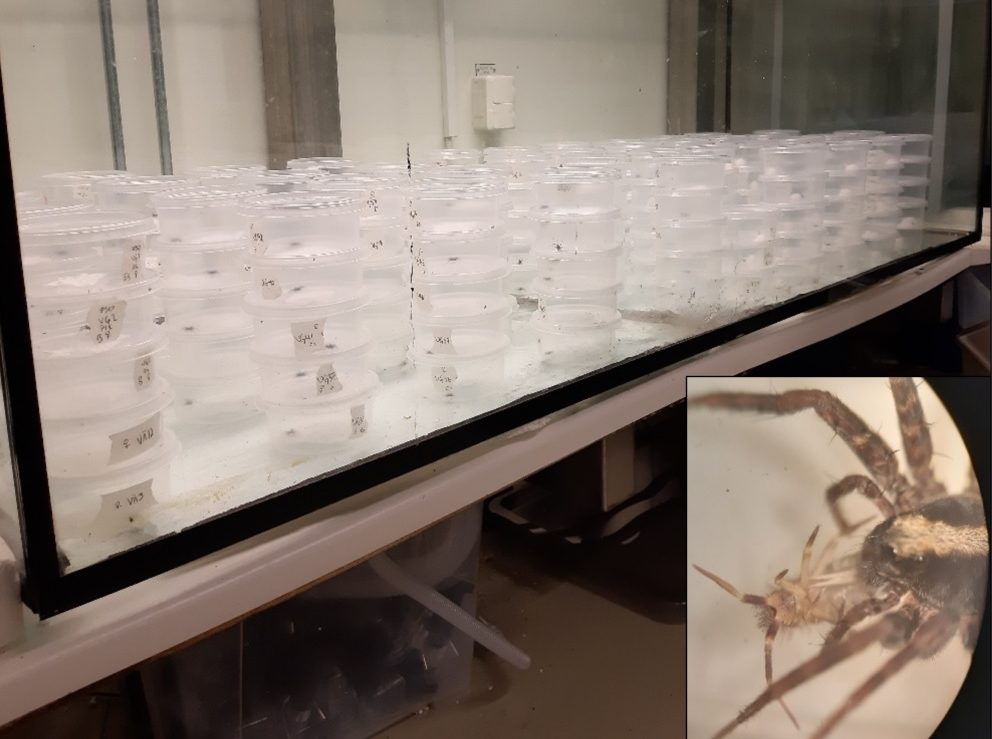
250+ wolf spider females in the lab at KAU. Inset: a Pardosa sp. (Lycosidae) paralyzing a collembola prey. Photos by Jeff Marker
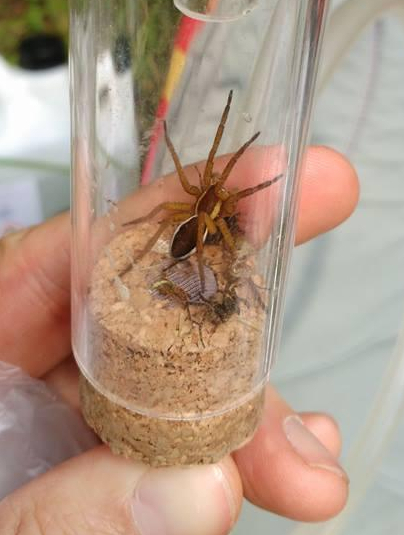 On Tuesday 8 October, Ann Erlandsson, Assistant Professor at Karlstad University, will give a seminar titled “DNA barcoding of spider gut contents”. The seminar starts at 13:15 in room 5F416. Everyone who wants to are welcome to attend the seminar.
On Tuesday 8 October, Ann Erlandsson, Assistant Professor at Karlstad University, will give a seminar titled “DNA barcoding of spider gut contents”. The seminar starts at 13:15 in room 5F416. Everyone who wants to are welcome to attend the seminar.
Jacqueline Hoppenreijs recently joined the NRRV research group. Here she writes about her previous work and what she intends to do as a PhD student at Karlstad University:
Hej! I’m Jacqueline Hoppenreijs and I recently started my PhD in the NRRV group at Karlstad University. During my MSc, which I did at the Department of Environmental Science at Radboud University in Nijmegen (the Netherlands) and the Department of Ecology at SLU Uppsala, I worked on different species groups: plants, birds and insects and wrote two theses. The first one, with fellow student Bas van Lith, explored possibilities for bird population restoration on the Indonesian island of Java, using historical sources on bird population development and land use change over the course of a century. During the second one, I studied the importance of different man-made habitat types for pollinators in Sweden, over the course of a season.
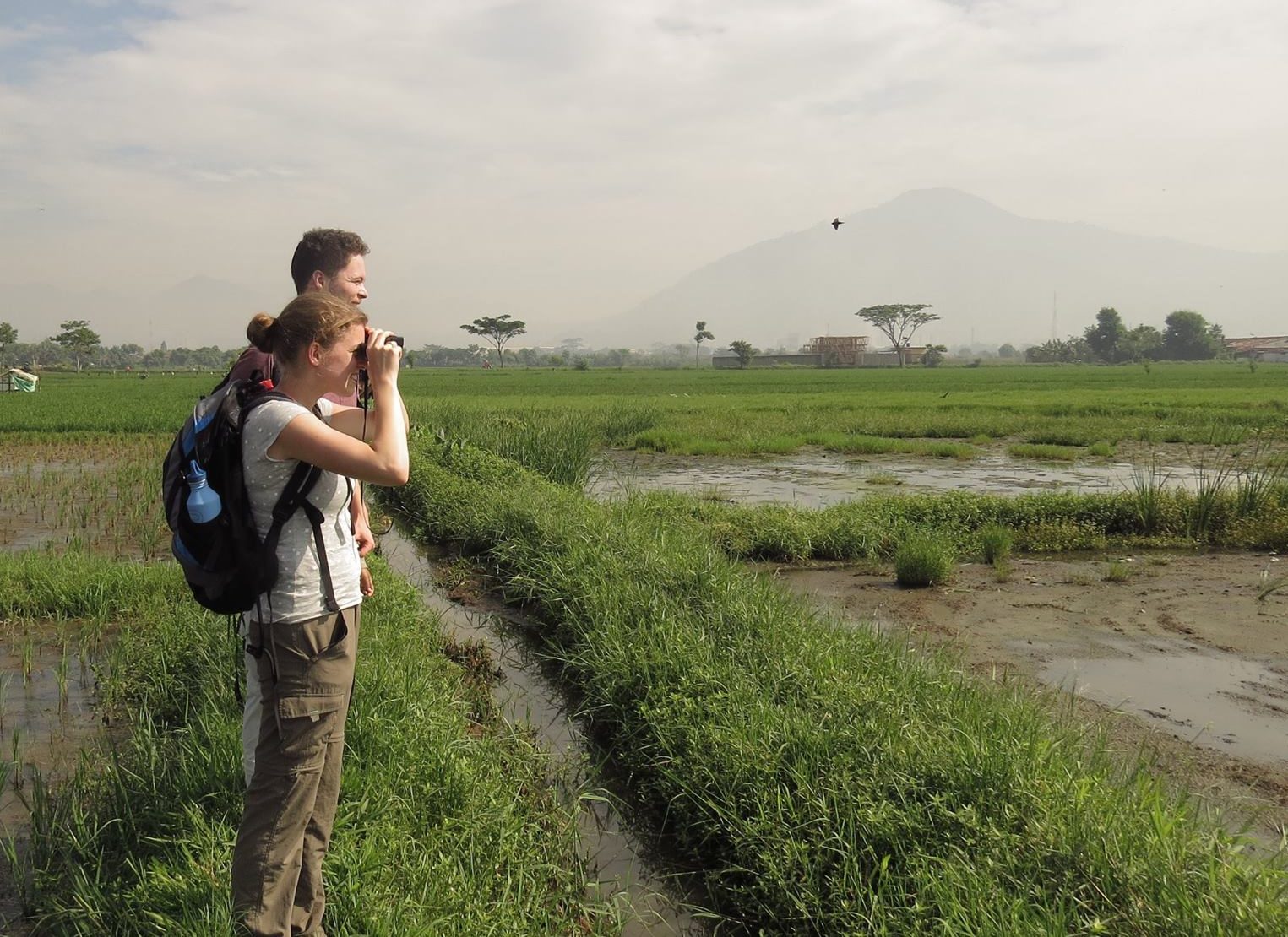
Bas and I birdwatching in Rancaekek, by Fachmi Azhar Aji
Despite studying quite different time frames and taxa, biodiversity, ecosystem functioning and conservation have been recurring themes. Coming from the overpopulated Netherlands, I find myself very interested in the interface of human society and nature, and more specifically nature restoration, conservation efforts and their ethical aspects.
As a junior researcher at the Department of Animal Ecology & Physiology at Radboud University, I dove a bit deeper in the influence that human actions can have on the natural world. I worked in Rob Leuven’s group to identify the potential risks of invasive (alien) species in horticulture, biological control and food forestry.
As from April 2019, I’m working with Lutz Eckstein and Lovisa Lind. We’re focusing on both fundamental and applied aspects of plant ecology and I’m looking forward to unravel the mechanisms that drive plant dispersal and community composition in boreal riparian zones. Next to that, I’m excited to be part of an active education environment and the passionate group of researchers that forms the NRRV, and can’t wait to meet the rest of Karlstad’s community!
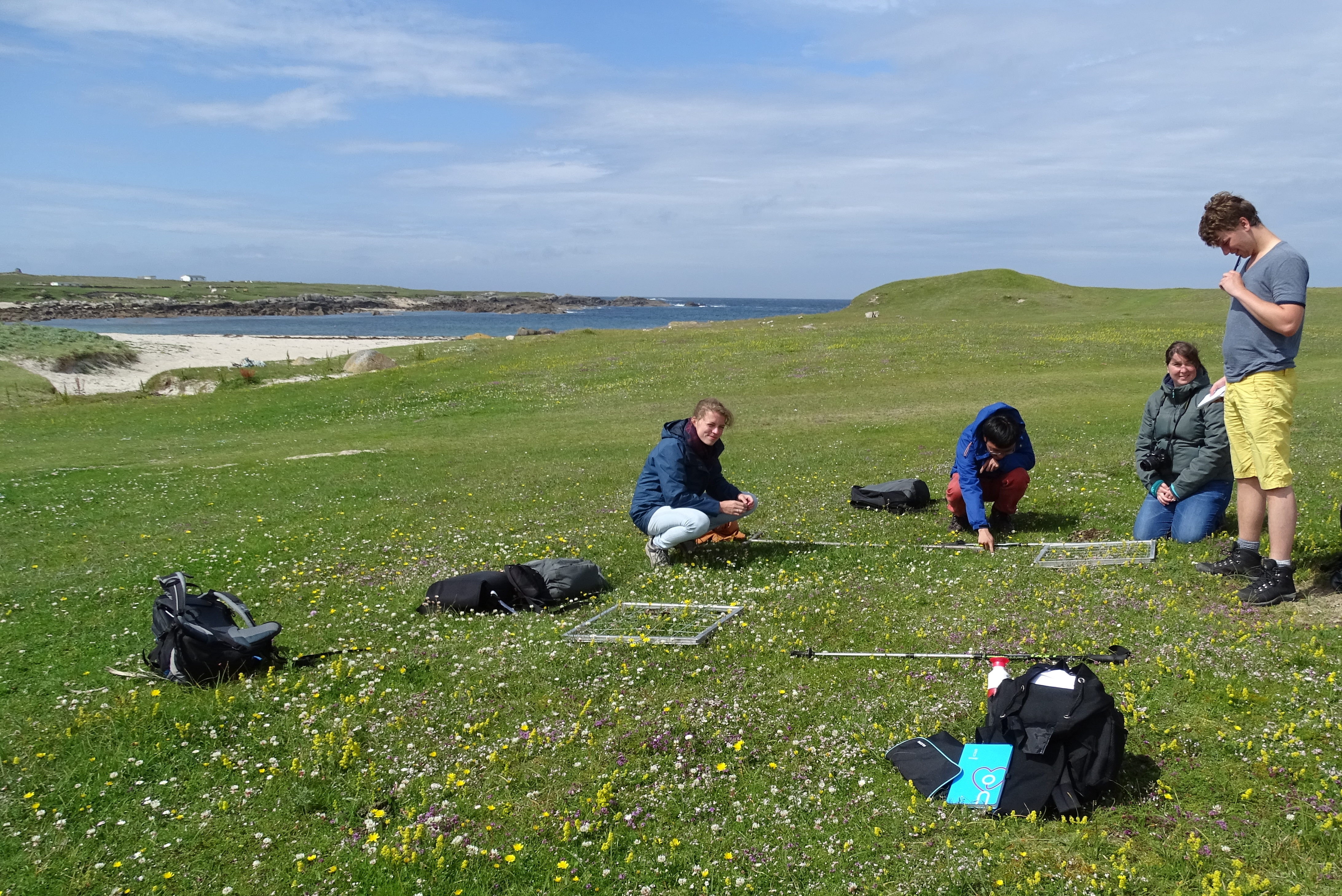
Vegetation sampling on Omey Island, by Joop Schaminée

Raft spider (Dolomedes sp.)
A PhD position in biology (community and food web ecology) is now open for application at Karlstad University. The project will focus on evaluating the ability of forested buffer strips to maintain cross boundaries fluxes between streams and riparian ecosystems.
The aim of the PhD project is to (i) analyse the link between riparian forest buffer width and functional diversity of riparian predator communities, (ii) define optimal buffer zones for conservation of riparian ecosystem functions, based on food web complexity and ecological niches (using stable isotopes) and (iii) use DNA-barcoding to study variation in prey preference with varying buffer width and test stable isotopes as a tool to assess riparian ecosystem functions in forestry affected landscapes.
The position is full time for four years but may be extended if department duties such as teaching (maximum 20 % of a full-time position) are included.
Last application date is 14 March 2019.
Read more and apply for the position here!
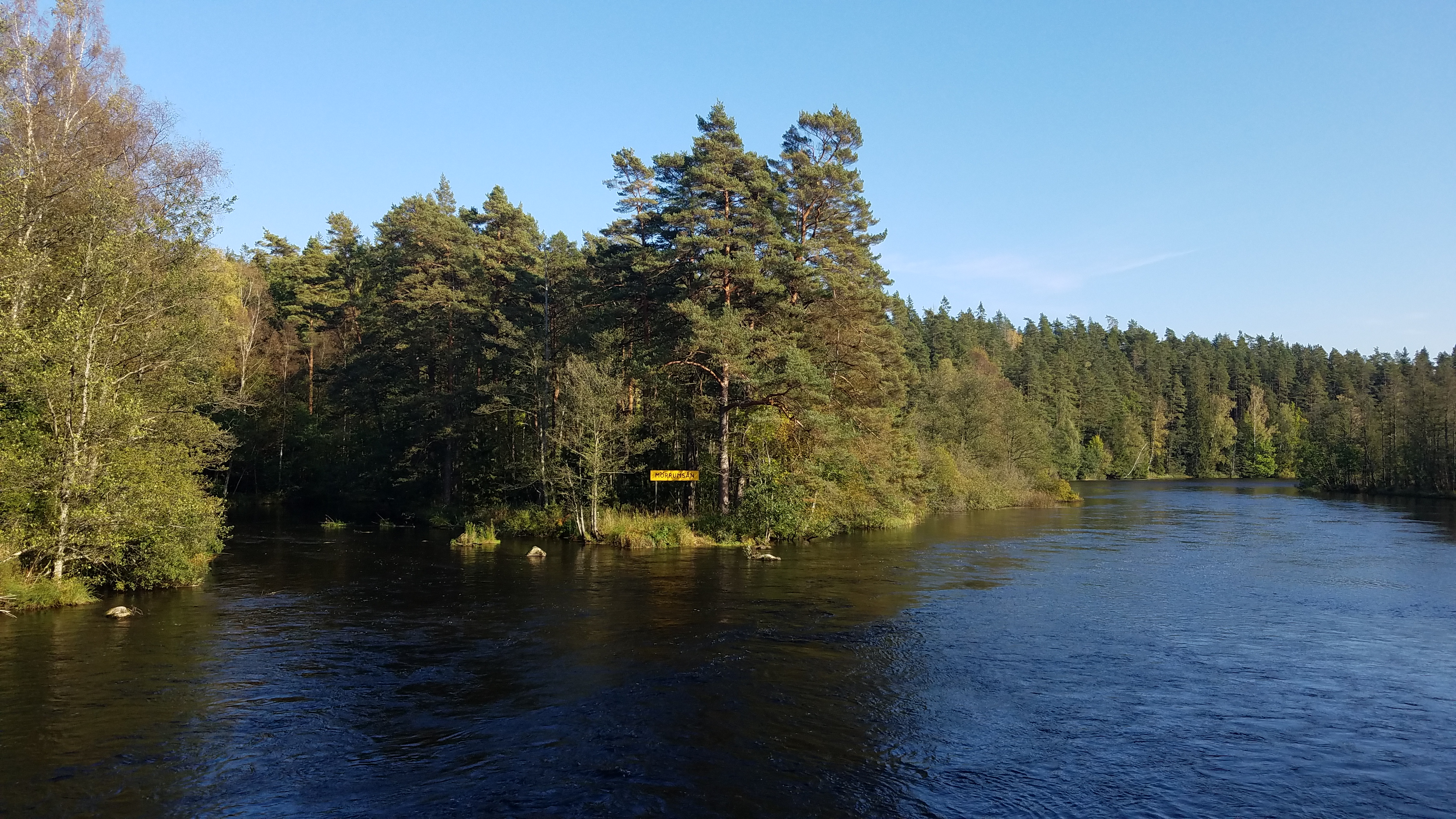
River Mörrumsån, Sweden
Two PhD positions (1: vegetation ecology, 2: ecosystem function/host-parasite interactions) are now open for applicants at Karlstad University. Both positions are full time for five years within the River Ecology and Management (NRRV) research group and include 80 % research and 20 % department duties (mainly teaching).
The applications for both positions close on 31 January 2019.
PhD position in vegetation ecology
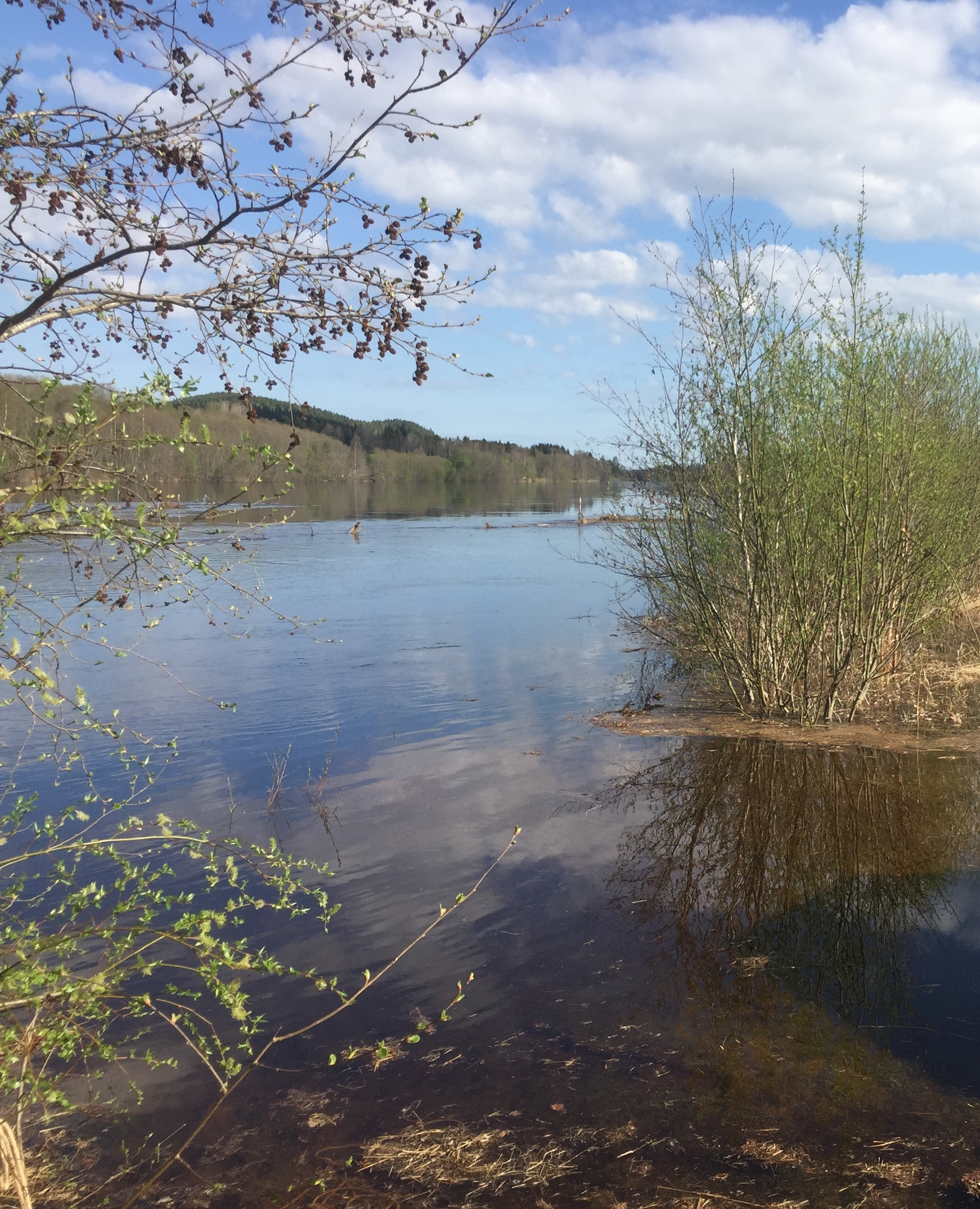
River Klarälven, Värmland
The project will study which factors control diaspore dispersal and plant community composition along boreal streams, which in turn may have cascading effects on functional plant diversity and ecosystem functioning. The specific research questions to be addressed will be decided in consultation with the candidate. Areas of particular interest are (1) the effects of local and landscape-scale factors for plant species composition and diversity and cascading effects on ecosystem functioning and (2) studies of factors promoting or constraining plant dispersal along streams.
Read more and apply for the position here!
Ecosystem function/host-parasite interactions
The position will focus on either the role of mussels for ecosystem function or host-parasite interactions. Areas of interest are (1) the role of mussels for stream ecosystem function and (2) host-parasite interactions between mussels and their host fish. The specific research questions to be addressed will be decided in consultation with the candidate.
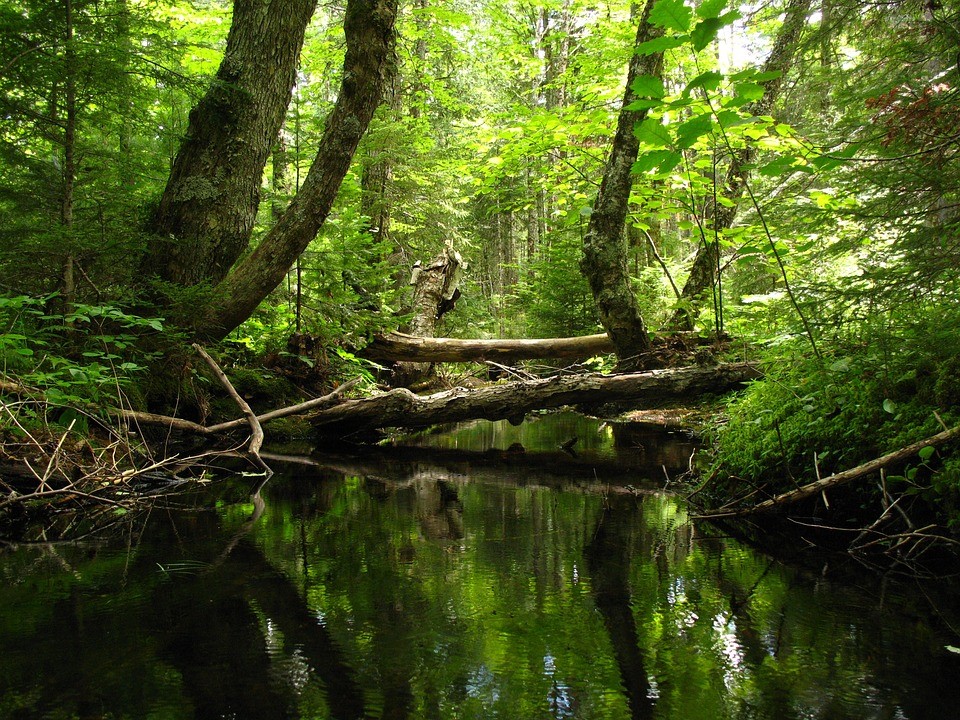 On Tuesday 11 December Lovisa Lind Eirell, Assistant Professor at Karlstad University, will give a seminar titled “The story of the seed – establishment and dispersal among different process domains”. The seminar will be held at 13.15 in room 5F416 at Karlstad University. Everyone who wants to are welcome to attend the seminar.
On Tuesday 11 December Lovisa Lind Eirell, Assistant Professor at Karlstad University, will give a seminar titled “The story of the seed – establishment and dispersal among different process domains”. The seminar will be held at 13.15 in room 5F416 at Karlstad University. Everyone who wants to are welcome to attend the seminar.
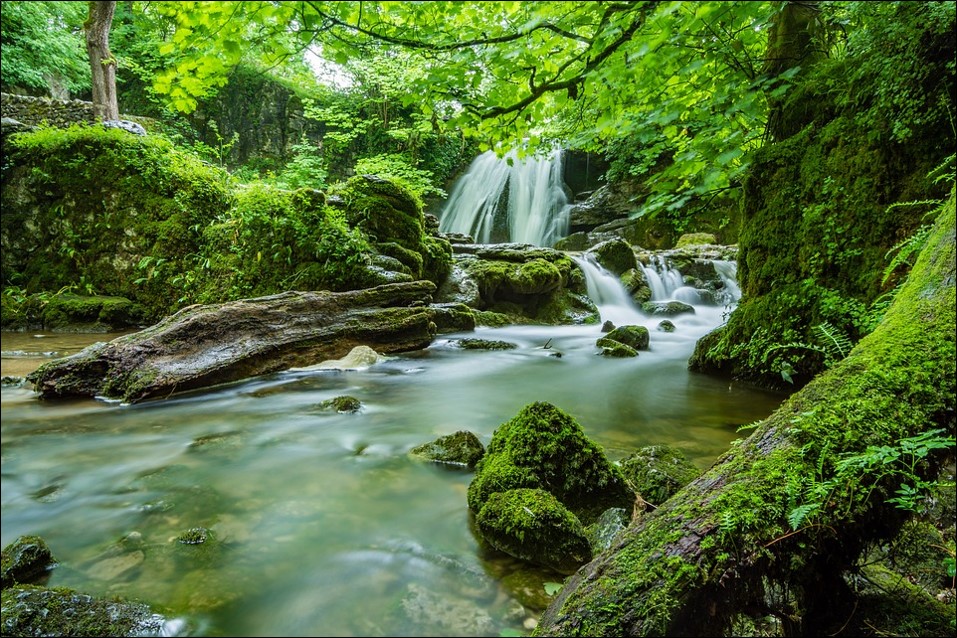 On Tuesday 13 November Denis Lafage, Postdoc at Karlstad University, will give a seminar titled ” Drivers of aquatic to terrestrial exchanges in riparian ecosystems: a worldwide approach using stable isotopes”. The seminar will be held in room 5F416 at 13:15. Everyone who wants to are welcome to attend the seminar.
On Tuesday 13 November Denis Lafage, Postdoc at Karlstad University, will give a seminar titled ” Drivers of aquatic to terrestrial exchanges in riparian ecosystems: a worldwide approach using stable isotopes”. The seminar will be held in room 5F416 at 13:15. Everyone who wants to are welcome to attend the seminar.
